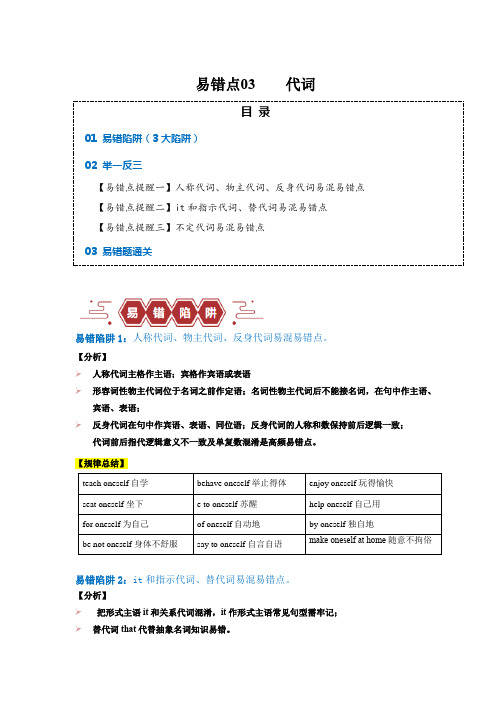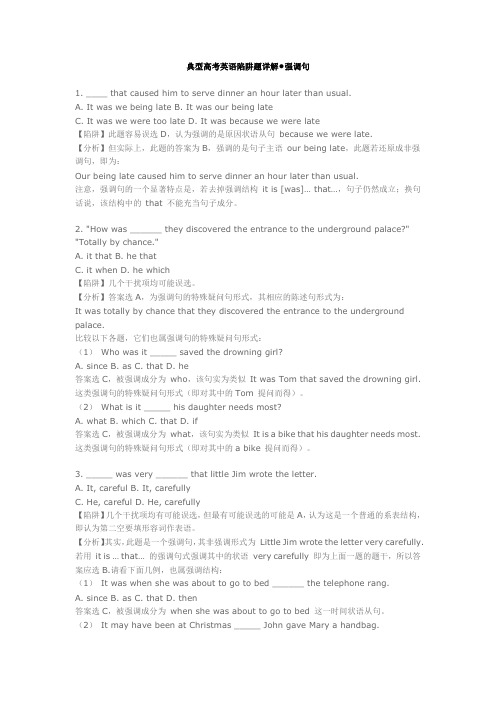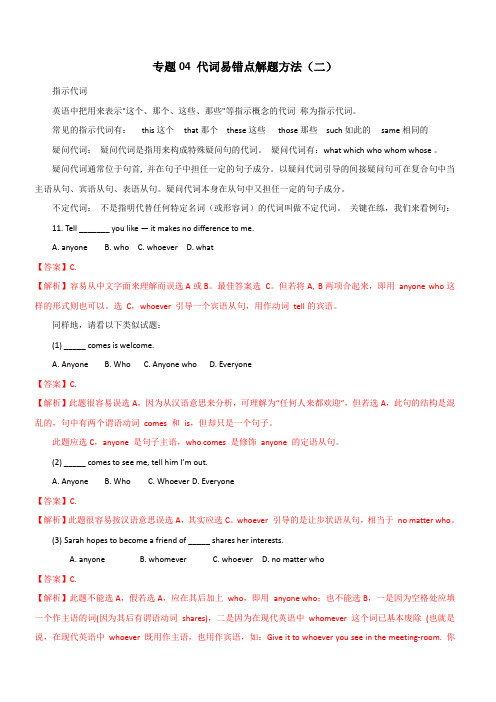高考英语典型陷阱题详解:代词类(2)
英语典型陷阱题

英语典型"陷阱题英语语法高考英语典型"陷阱题"解析95例2009-03-14 15:401.Mary couldn't make herself _______attention to because her classmates made so much noise.A. paidB. to payC. payD. paying答案解析:此题容易误选C, 其实此题应选A. pay attention to是动词短语,起及物动词的作用,在句中作宾语补足语,与宾语herself构成被动关系.2.Was it through Mary , ____ was working at a high school , _____ you getto know TomA. who, whoB. that, whichC. who, thatD. who, which答案解析: 此题应选C,但是许多学生刚好首先排除了C项,他们认为:(1)非限制性定语从句不用关系代词that 引导;(2)强调句型It be + 被强调部分+ that (who)…中,who (that)前不能有逗号.上述两点是对的,在此句中Wasit…that…也的确是强调句型,但句中的两个逗号不在强调句型中,它的作用是把非限制性定语从句who was working at a highschool与句子其它部分分隔开来.整句话的汉语意思是:玛丽在一所中学工作,你是不是通过她认识汤姆的3.Every minute is made full use of _______ our lessons.A. studyingB. to studyC. studyD. being studied答案解析:此题容易误选A,认为动名词作介词的宾语.其实此题应选B,此句是被动句,转换成主动句就成为we make full use of every minute to study our lessons..是不定式作目的状语.4.I agree with most of what you said, but I don't agree with _____.A. everythingB. anythingC. somethingD. nothing答案解析: 此题容易误选B,生搬硬套不定代词用法规则:something用于肯定句,anything用于否定句或疑问句.其实此题应选A,注意前文的Iagree with most of what yousaid(我同意你说的大部分内容),其后的not与everything构成部分否定,意为"不是所有的都同意",前后两部分用转折连词but连接,语气通顺,连贯.5. —Would you like _______ , sir —No, thanks. I have had much.A.some more orangesB.any more orangesC.some more orangeD.any moreorange答案解析:选C.当用委婉的语气希望得到对方肯定回答的时候,疑问句中的some不能变成any.从答语中的much可判断出前面的名词应该是不可数的.此句话的汉语意思是:-先生,还要点橙汁吗-不了,谢谢,我已喝了很多了.6.He suggested the person referred _______ put into prison.A. isB. beC. to beD. should be答案解析:此题应选C. referred to 过去分词作定语,be put intoprison是宾语从句的谓语部分.学生由于粗心,容易误选B或者D.7.—Well. I do think the rabbit is a beautiful, gentle animal which can runvery fast.—_____________.A.So it isB.So is itC.So does itD.So it does答案解析:此题容易误选B,平时同学们经常练习和so有关的倒装句:so放在句首,表示前面的肯定内容也适用于另一个人或物.其结构为:so +助动词+主语.因此在未完全理解题意时,就主观地选择了B.其实最佳答案为A.本题考查\"so+主语+助动词\"结构,用来表示赞成前一说话者所说的内容,可译为\"是的\",\"对\"或\"确实如此\".此句话的汉语意思是:-哎, 我真地认为这兔子是一只漂亮温顺的动物,跑得很快.- 确实如此.8."Is there _____ here " "No, Bob and Tim have asked for leave."A. anybodyB. everybodyC. somebodyD. nobody答案解析:此题容易误选A,认为这是一般疑问句,要用anybody.其实此题应选B,主要与上下文的语境有关.全文语境为:"大家都到齐了吗""没有,Bob和Tim两人请假了."9."I think the teacher is wrong, _____ " "No, I don't think so."A. don't youB. don't IC. doesn't heD. doesn't she答案解析:此题容易误选C或D,因为按照语法规则,Ithink后接宾语从句时,其反意疑问句与从句保持一致,但是退一步,即使按此规则,其反意疑问句也应是isn'the或isn't she之类的,而不是像C或D那样用doesn't he和doesn'tshe.综合四个选项,最佳答案为A,don't you为don't you think so之省略.10.Don't you know _____, my dear friend, it is you that she lovesA. whoB. whichC. thatD. what答案解析:此题容易误选A或B,选A者认为这是指人的,故用who;选B者认为这是非限制性定语从句,两者都是误认为这是定语从句(注意没有先行词),其实此题应选C,that引导的是一个宾语从句(用做动词know的宾语),它只是被句中的插入语mydear friend隔开罢了.其实此句也可说成:My dear friend, don't youknow that it is you that she loves11. He transplanted the little tree to the garden _____ it was the besttime for it.A. whereB. whenC. thatD. until答案解析:此题容易误选C, 把thegarden看成是先行词,以为是where引导的表地点的定语从句.其实此题应选B.这是when引导时间状语从句.此句话的汉语意思是:他把小树在最合适的时候移植到花园.12.If the weather is fine, we'll go. If _____, _____.A. not, notB. no, noC. not, noD. no, not答案解析:此题应选A.If not, not.为If the weather is NOTfine, we will NOTgo.之省略,全句意为"如果天气好,我们就去;如果天气不好,我们就不去".该句的特点是:后句与前句的用词和句式完全相同,只是前句为肯定,后句为否定,为了简洁起见,于是将后句与前句相同部分省略,只保留否定词not.13.--- Mum, why do you always make me eat an egg every day--- ____ enough protein and nutrition as you are growing up.A. GetB. GettingC. To getD. To be getting答案解析: 此处回答why, 因而答案选C. 作目的状语.14.She's too thin. She ____ gain some weight but she _____ too little.A. would, ateB. will, eatsC. would, eatsD. will, ate答案解析:此题有些难度,许多同学不知如何分析.我们先根据题目所提供的选项将句意大致概括出来:她太瘦了.她会增加体重的,但她吃得太少了.根据句首She'stoothin这一所给信息可知,"她瘦"应是客观事实.按照一般的常识,"吃得少"就会导致"瘦","吃得多"就会导致"胖",根据句首的信息,"她瘦"是客观事实,所以她"吃得少"也应是事实,因此第二空应填eats(即用一般现在时表示现在的事实).根据上面的分析:"她瘦"和"她吃得少"均为现在的事实,那么"她体重会增加"就应是假设(注意句中的转折连词but),所以第一空应填would,其实,此句可理解为其后省略了一个条件状语ifshe ate more (如果她多吃一点的话).此题最佳答案选C.15. — What should I do with this passage—_____ the main idea of each paragraph.A. Finding outB. Found outC. Find outD. To find out答案解析:此题极易误选A.认为是动名词短语作do的宾语.其实我们把该答案代入原文,便发现不行.因为do findingout…是绝对不能搭配的.其实此题应选C.考查祈使句.此句话的汉语意思是:-我应该怎么处理这段文章- 归纳出每段的中心思想.16.She can't help _____ the house because she's busy making a cake.A. to cleanB. cleaningC. cleanedD. being cleaned答案解析:此题容易误选B,简单地套用can't help doingsth这一结构.其实此题应选A,注意以下两个结构均可用,但是含义不同:can't helpdoing sth =禁不住做某事,情不自禁地做某事;can't help to do sth=不能帮助做某事.前者为引申用法,一般辞书均将其作为固定搭配列出来,许多老师对此也比较强调,从而就使同学们形成了思维定势;而后者为help表示"帮助"时的本义用法,因同学们平时对此不大注意,一看到上面的试题马上就联想到can'thelp doing sth这一结构,从而误选了B.17. The prize of the game show is $30,000 and an all expenses __________vacation to China.A. payingB. paidC. to be paidD.being paid答案解析:选B.此句话的汉语意思是:"联众秀"的奖金是3万美元和一次一切费用全免的中国之旅.paid和expenses之间存在着逻辑上的动宾关系,过去分词作定语修饰expenses.整个allexpenses paid又作定语修饰vacation. 多数考生没把all expensespaid看成一个整体,而认为all expenses和pay 存在着逻辑上的主谓关系;pay和vacation存在着逻辑上的动宾关系;而误选答案A.18.I'm examining the composition he has just finished ____ the possiblemistakes in it.A. correctingB. to correctC. correctedD. correct答案解析:此题容易误选A,因为习惯思维finish 后接doing. 但从句he has justfinished为定语从句.答案选B,动词不定式作目的状语.19.He ________ more than 5,000 English words when he entered theuniversity at the age of 15.A. has learnedB. would have learnedC. learnedD. had learned答案解析:此题容易误选C,学生见到过去时间点,就会依据平时的经验选择一般过去时.其实此题应选D.掌握了5000多个单词并非在15岁上大学时发生,而是早在之前就完成了,过去的过去, 所以要用过去完成时.此句话的汉语意思是:在他15岁上大学时,就已经掌握了5000多个单词了.20.The judge paid no attention to _____ he had just lost his wife.A. thatB. whichC. whatD. the fact that答案解析:此题容易误选A或B:选A,认为to后应接一个that引导的宾语从句;选B,认为其后是一个定语从句,介词后应用关系代词which.其实此题应选D.注意不能选A的原因是,在通常情况下,介词后不能直接跟that从句(极个别介词如except,but等除外),遇此情况,应在that从句前加上the fact(此时thefact用做介词宾语,其后that从句用做the fact的同位语).21. ____ a broken chair , the room is emptyA. ExceptB. Except forC. Except thatD. Besides答案解析:except所指项目,必须在主句内有所交代,except for用来表示从某一细节方面来修正前面概括性说法,其后的宾语一般与句子所涉及的东西不同类.因此a broken chair 与the room不是同类,答案为B.22. — What should I do with this passage—_____ the main idea of each paragraph.A. Finding outB. Found outC. Find outD. To find out答案解析:此题极易误选A.认为是动名词短语作do的宾语.其实我们把该答案代入原文,便发现不行.因为do findingout…是绝对不能搭配的.其实此题应选C.考查祈使句. 此句话的汉语意思是:-我应该怎么处理这段文章- 归纳出每段的中心思想.23.The wonderful time they had been looking forward ____ at last.A. to arriveB. to arrivedC. to arrivingD. should arrive答案解析:此题迷惑选项为C,因受look forward todoing的影响,但此题主语为the wonderful time,后面they have beenlooking forward to 为定语从句,分析句子结构,找出句子的主干Thewonderful time arrived at last.不难发现正确答案应为B.24. --- What do you think made Mary so upset--- ____ her new bicycle.A. As she lostB. LostC. LosingD. Because of losing.答案解析:此题迷惑项为D,这是犯了Chinglish之错,问句中的what只能用动名词短语Losing her newbicycle来代替.答案B为过去分词不作主语,答案A不构成主语从句.若将答语补充完整,全句为Losing her new bicycle madeMary so upset.因此缺少主语,正确答案为C.25.He wrote a lot of novels, none of _____ translated into a foreignlanguage.A. themB. which C . it D. what答案解析:同学们容易误选B,理由是none前没有并列连词and 或but,但B项是一个陷阱.此题的最佳答案应是A,注意此句不是并列句也不是含有非限制性定语从句的复合句.逗号后面其实是一个独立结构.translated不是谓语,而是一个非谓语动词(过去分词),所以假若在translated 前加一个助动词was,则此题应选(which),构成一个非限制性定语从句.所以做这类题要特别小心,千万不要想当然,更不要受思维定势的影响.26.Mr. Smith is a painter, _____ I should also like to be.A. thatB. whichC. whoD. it答案解析:此题很容易误选C,因为许多同学认为指人时总是用who,不能用which,选项A(that)虽然也能指人,但这是非限制性定语从句,也不能用.其实此题应选B(which),因为这里的which其实指的不是具体的某个人,而是指一个人的特征或属性,此时不能用who.27. As soon as he comes back, I'll tell him when _______ and see him.A. you will comeB. will you comeC. you comeD. do you come答案解析:选 A.此句话的汉语意思是:他一回来,我就会告诉他你什么时候会来看他.when引导的是一个宾语从句,不是状语从句.根据题意要用一般将来时.粗心考生会把when引导的句子误认为是状语从句,从而得出错误的结论:主句用一般将来时,从句用一般现在时表将来而误选C.28..I agree with most of what you said, but I don't agree with ____.A. everythingB. anythingC. somethingD. nothing答案解析:受否定句影响,迷惑选项为B.此题语境性极强,第一句中"most of what yousaid"为关键点,"你说的大部分我都同意,但并不是所有的我都同意".因此,考查的是部分否定,答案为A.29.After ____ seemed like hours he came out with a bitter smile.A. whichB. itC. whatD. that答案解析:此题应选C,其余三项都很容易误选.误选A,认为介词后应接关系代词which(但是,若填关系代词,其前没有先行词);B或D也不能选择,因为介词后可接what引导的宾语从句,但通常不能跟that引导的宾语从句或没有引导词的从句.另一方面,引导名词性从句的that也不能充当句子成分(句中的seemed缺主语).选C,what引导的是宾语从句,用做介词after的宾语,其中的what可理解为sometime that.30.He was so angry at all _____ she was doing _____ he walked out.A. what, thatB. that, thatC. that, whichD. what, as答案解析:此题关键短语be angry at sth.因此all后的she wasdoing为定语从句,修饰all.第二个空考查so...that...句型, 答案应为B .31. --- When shall we meet again --- Make it ____ day you like; it's allthe same to me .A. oneB. anyC. anotherD. some答案解析::...you like和...it's all the same to me表明说话人不在意哪一天,因此some day是错误的;anotherday需要前提:已谈论的时间不合适,应另选时间,但对话无此意.Oneday并不指"任意选择的一天",而any day则有此意,故正确答案为B.34. —Did Jack come back early last night—Yes. It was not yet eight o'clock _______ he arrived home.A.beforeB.WhenC.thatD.until答案解析:此题容易误选, 学生误认为此题在考查: (1) it…before…句型;(2) 强调句;(3) not…until…句型.其实此题应选B.eighto'clock是时间点,这是when引导的时间状语从句.此句话的汉语意思是:-杰克昨晚回来得很早吗-是啊,他到家的时候还不到8点35.--- Alice , you feed the bird today , ______--- But I fed it yesterday .A. do youB. will youC. didn'tD. don't you答案解析:此题易受you feed the bird today中的you的影响,认为不是祈使句.但祈使句并非都无主语,为了加强语气,指明向谁提出请求或命令,引起听话者的注意时,可说出主语.所以正确答案是B而不是D.36.She is quite a different girl _____ she was five years ago.A. fromB. toC. thanD. with答案解析: 按照英语的表达习惯,要表示甲与乙不同,通常用be differentfrom,如:Mary is different fromJane.玛丽与简不同.其中的介词from在英国英语中也可换成to,在美国英语中也可换成than,但两者均不如用from普遍.许多同学据此将上题的最佳答案确定为A,但错了,最佳答案应是C.一般说来,若两个比较的对象是名词,代词或状语短语等,则用different from[to, than].但是若提出来供比较的对象是一个没有引导词的句子,则通常只用different than.37.Few pleasures can equal ______ of a cool drink on a hot day.A. someB. anyC. thatD. those答案解析::一看到few pleasures,容易错选D.但后面所设条件为a cooldrink,因而正确答案应为C.e an umbrella to _____ you from the rain.A. stopB. preventC. keepD. protect答案解析:许多同学一看到题干中的from,再联系到选项中的prevent,便马上想起了prevent... from ...这个常用搭配,于是选择了B答案.这样分析的同学,没有完全弄清prevent ... from ...的用法特点.在prevent A fromB这一句式中,A和B通常具有主谓关系,如在The rain prevented us from going out(下雨使我们不能出去)中,"我们"与"出去"就具有主谓关系.而上面一题不具备此特点,此题正确答案应是D,protect ... from...意为"保护……免受……".39..Who did the teacher have ___ an article for the wall newspaper justnowA. writtenB. writingC. writeD. to write答案解析:此题易误选A,受have的影响.其实此处所用句型为have sb.dosth不妨把who换为tom,利用还原句子结构的方法变为肯定句:The teacher hadTom write an article for the wall newspaper just now.因此,答案应选C.40. He transplanted the little tree to the garden _____ it was the besttime for it.A. whereB. whenC. thatD. until答案解析:此题容易把thegarden看成是先行词,以为是where引导的表地点的定语从句而误选C.其实此题应选B.这是when引导时间状语从句.此句话的汉语意思是:他把小树在最合适的时候移植到花园.41.Shirley _____ a book about China last year, but I don't know whethershe has finished it.A. has writtenB. wroteC. had writtenD. was writing答案解析:受lastyear的干扰而误选B项,但句意为"Shirley去年(一段时间)在写一本有关中国的书,但我不知她现在是否写完",因此答案为D.42. --- Who should I send this message to --- The mayor is the one ___A. to send itB. to be sentC. for sendingD. to send it to答案解析:第一句提供了语境"应把消息送给谁""应送给市长".故A是错误的,正确答案为D,即send the message to themayor.被修饰的名词为不定式的间接宾语时,不定式后应加上适当的介词.43.It is so difficult a problem that _____ student in this class _____work it out.A. any, can'tB. no, canC. every, canD. no, can't答案解析:此题很容易误选A,因为从句意上看,选A可将此句理解为"这个问题是如此之难,这个班上任何一个学生都不可能做出来".但按英语习惯,any(任何一个)作为非肯定词,它只能出现在否定词not之后,而不能在其前,即可说notany,但不说any not.所以正确答案应选B.44.The young man spent as much time as he _____ over his lessons.A. wentB. can goC. could goingD. could to go答案解析:此题除考查理解句子结构的能力外,还考查了动词短语spend sometime(in)doing sth的用法,所以答案为C.45_____ is known to everybody, the moon travels round the earth once everymonth.A. ItB. AsC. ThatD. What答案解析: 此题很容易误选A,认为此处应填一个形式主语,况且It is (well) knownto...也是一个常用句型,读起来也很上口,但是选A错了.同学们仔细想想看,假若选A,横线处填一个形式主语(it),那么其后就应有一个真正的主语,但事实上没有.但是若将句中的逗号改成that,则只能选A,因为这样一来,that便成为一个引导主语从句的引导词.此题的最佳答案是B,as引导的是一个非限制性定语从句,可置于主句前(常译为"正如")或主句后(常译为"这一点"),句意为"正如大家所知,月球每月绕地球转一周".46. —Must I turn off the gas after cooking —Of course . You can never be_______ careful withthat.A.enoughB.tooC.soD.very答案解析:选B.can / couldnot...too是一个固定搭配,表示"无论怎样也不过分;此句话的汉语意思是:-做完饭后一定要把煤气关掉吗- 当然,你越小心越好. 有些学生误认为can never be too…是一个孤立的结构,而逐字翻译,从而误选D.47.Mrs Brown was much disappointed to see the washing machine she had had____ went wrong again.A. itB. it repairedC. repairedD. to be repaired答案解析:此题句型为have sth done, she had had repaired为定语从句,修饰the washing machine,C为正确答案.迷惑选项为B项.48. --- Don't forget to come to my birthday party tomorrow. ---______ .A.I don'tB.I won'tC.I can'tD.I haven't答案解析::完整回答为I won't forget to come to your birthdayparty tomorrow.答案为B. 选A是受上一句中Don't 影响.49.I'll come to see you if _____.A. you're convenientB. it is convenient for youC. you feel convenientD. it is convenient with you答案解析:此题最佳答案为B,但很容易误选A或C,因为按汉语意思,我们常说"如果你方便的话",所以许多同学就将此直译为if you areconvenient或if you feelconvenient.但事实上,英语中convenient的意思不是"感到方便的",而是"使人感到方便的",所以beconvenient的主语不能是"人".要表示"如果你方便的话",英语通常说if it isconvenient for[to]you,其中的介词可用for或to,但一般不用with.50.Sarah hopes to become a friend of _____ shares her interests.A. anyoneB. whomeverC. whoeverD. no matter who答案解析:此题不能选A,假若选A,应在其后加上who,即用anyonewho;也不能选B,一是因为横线处应填一个作主语的词(因为其后有谓语动词shares),二是因为在现代英语中whomever这个词已基本废除也就是说,在现代英语中whoever 既用做主语,也用做宾语,如:Give it towhoever you see in the meeting-room.你在会议室里看见谁就把它给谁);也不能选D,因为no matterwho只用于引导让步状语从句,不用于引导名词性从句.此题正确答案为C,whoever 在此相当于anyone who.同学们在平时做题的过程中常常有这样的现象:有些题目看起来似曾相识,他们从原有的知识经验出发,机械地套用老方法,按某种固定的思路去思考问题,轻而易举地得出“正确答案”,结果往往发现自己错了。
2024年高考英语易错题(新高考专用)易错点07动词的时态和语态(4大陷阱)2

易错点07 动词的时态和语态目录01 易错陷阱(4大陷阱)02 举一反三【易错点提醒一】一般现在时、一般过去时和现在完成时易混易错点【易错点提醒二】一般过去时和过去完成时易混易错点【易错点提醒三】现在完成时和过去完成时易混易错点【易错点提醒四】主动语态与被动语态易混易错点03 易错题通关易错陷阱1:一般现在时、一般过去时和现在完成时易混易错点。
【分析】【高考链接】(2023年浙江卷1月)The large siheyuan of these highranking officials and wealthy businessmen often________ (feature)beautifully carved and painted roof beams and pillars(柱子).【答案】featured【解析】考查动词时态。
句意:这些高级官员和有钱商人的高大的四合院,通常以雕刻精美和被粉刷的房顶横梁和柱子为特点。
分析句子结构可知,空格处需要填谓语动词,再结合and后动词时态可知,空格处应用一般过去时。
故填featured。
易错陷阱2:一般过去时和过去完成时易混易错点。
【分析】1.下列动词hope、wish、expect、think、intend、mean、suppose等,用过去完成时表示“原本……(事实上未能……)”。
2.This/It/That was the first/second/third ... time that ...表示“这/那是(某人)第几次做某事”,that从句中要用过去完成时。
3.hardly ... when ...和no sooner ... than ...两个句型中,主句均用过去完成时。
易错陷阱3:现在完成时和过去完成时易混易错点。
【分析】易错陷阱4:主动语态和被动语态易混易错点。
【分析】➢受母语干扰,翻译上下文时混淆被动语态与主动语态。
➢混淆谓语动词被动语态构词be+done与非谓语动词重点过去分词done。
2024年高考英语易错题(新高考专用)易错点03代词(3大陷阱)

易错点03 代词目录01 易错陷阱(3大陷阱)02 举一反三【易错点提醒一】人称代词、物主代词、反身代词易混易错点【易错点提醒二】it和指示代词、替代词易混易错点【易错点提醒三】不定代词易混易错点03 易错题通关易错陷阱1:人称代词、物主代词、反身代词易混易错点。
【分析】➢人称代词主格作主语;宾格作宾语或表语➢形容词性物主代词位于名词之前作定语;名词性物主代词后不能接名词,在句中作主语、宾语、表语;➢反身代词在句中作宾语、表语、同位语;反身代词的人称和数保持前后逻辑一致;代词前后指代逻辑意义不一致及单复数混淆是高频易错点。
【规律总结】易错陷阱2:it和指示代词、替代词易混易错点。
【分析】➢把形式主语it和关系代词混淆,it作形式主语常见句型需牢记;➢替代词that代替抽象名词知识易错。
【规律总结】it 作形式主语和形式宾语常见句型【规律总结】替代词one代替可数名词单数, 复数形式分别有ones;that代替不可数名词和the+可数名词单数(尤其后面跟of时),复数形式those;it代替上文所指词本身。
易错陷阱3:不定代词易混易错点。
【分析】all与both; either与neither;each与every; little与few; no one与none;【易错点提醒一】人称代词、物主代词、反身代词易混易错点【例1】(湖南省永州一中20232024学年高三试题)Growing up in a different environment from______ (they) elders, they have witnessed China’s rise as a global economic powerhouse and formed a brandnew consumption concept.【变式1】(湖北省宜荆荆恩20232024学年高三起点试题)Some people even cook Luosifenbased hotpot_______ (they).【变式2】(2023年天津高三校模拟)Toys of the children today hardly have any resemblance to ______ of _______ when we were little kids.A.that; oursB. those; usC. that; usD. those; ours【变式3】(辽宁省六校20232024学年高三联考试卷)On the basis of research that he has done for the past six years, Dr. Zimbardo estimates that about 40 percent of all Americans, around 84 million people, consider (they) shy.【易错点提醒二】it和指示代词、替代词易混易错点【例2】(广东省新高考高质量测评省级联考试题)When the BBC asked her what kind of person_______ takes to walk around the world, Maxwell said, “It’s probably a bination of ambition, a little stubbornness and a pinch of passion—not for hiking as a sport, but for selfdiscovery and adventure.【变式1】(广东省梅州市曾宪梓中学2023年高三质检试题)“We always carry the bamboo basket when we work in the field. We all regard as a symbolic farming tool of the Wa ethnic group.【变式2】(2023年河南省高三诊断测试)China’s winning the host of the Olympic was an exciting moment, _______ all Chinese will never forget.【易错点提醒三】不定代词易混易错点【例3】(2023年河南省郑州市高三模拟)Lily had lived in London and Manchester, but sheliked________ and moved to Cambridge.【变式1】(2023年全国专项练习)In some countries, people eat with chopsticks, while in ______, knives and forks.【变式2】(2023年安徽高三专项练习)The project requires close teamwork, _______ will be achieved unless we work well together.1.(2023年新高考I卷)Nanxiang aside, the best Xiao long bao have a fine skin, allowing them to be lifted out of the steamer basket without tearing or spilling any of ________(they) contents.2.(湖南省长沙麓山国际实验学校20232024学年高三试题)Finding the pe rfect fusion o f tradition3.(湘豫名校联考20232024学年高三试题)Unlike (it) seemingly simple appearance, making a guqin is extremely demanding.4.(江苏省20232024学年高三学情调研试题)We must first of all have confidence in (we).exact.6.(2023年全国高三校考练习)Within industries, panies are always trying to develop products that are one step better than of other panies.7.(2023年全国高三校考练习)Building a new school is one thing, while keeping it running smoothly is quite.8.(2023年全国高三校考练习)Sometimes,we take for granted that everything has to be perfect for us and we expect high q uality products and service.9.(2023年全国高三校考练习)The old man has three sons, but none of (they) is a doctor.10.(2023年全国高三校考练习)—How about the price of these refrigerators?—They’re equal in price to, if not cheaper than, the at the other stores.11.(2023年全国高三校考练习)This school is one of the top schools in our city, equipped with modern teaching equipment.12.(2023年全国高三校考练习)He got a new haircut and got (he) up in a suit, then headed for the hall.13.(2023年全国高三校考练习)Smith has two strategies, of which seems to have worked very well.14.(2023年全国高三校考练习)You ought to behave in public, or you may annoy the people around you.15.(2023年全国高三校考练习)The man distinguished (he) by his wisdom.。
典型高考英语陷阱题详解

典型高考英语陷阱题详解•强调句1. ____ that caused him to serve dinner an hour later than usual.A. It was we being lateB. It was our being lateC. It was we were too lateD. It was because we were late【陷阱】此题容易误选D,认为强调的是原因状语从句because we were late.【分析】但实际上,此题的答案为B,强调的是句子主语our being late,此题若还原成非强调句,即为:Our being late caused him to serve dinner an hour later than usual.注意,强调句的一个显著特点是,若去掉强调结构it is [was]… that…,句子仍然成立;换句话说,该结构中的that 不能充当句子成分。
2. "How was ______ they discovered the entrance to the underground palace?" "Totally by chance."A. it thatB. he thatC. it whenD. he which【陷阱】几个干扰项均可能误选。
【分析】答案选A,为强调句的特殊疑问句形式,其相应的陈述句形式为:It was totally by chance that they discovered the entrance to the underground palace.比较以下各题,它们也属强调句的特殊疑问句形式:(1)Who was it _____ saved the drowning girl?A. sinceB. asC. thatD. he答案选C,被强调成分为who,该句实为类似It was Tom that saved the drowning girl. 这类强调句的特殊疑问句形式(即对其中的Tom 提问而得)。
2020年高考英语词汇语法专题4:代词易错点解题方法(含答案解析)

专题04 代词易错点解题方法(二)指示代词英语中把用来表示"这个、那个、这些、那些"等指示概念的代词称为指示代词。
常见的指示代词有:this 这个 that 那个these 这些those 那些such 如此的same 相同的疑问代词:疑问代词是指用来构成特殊疑问句的代词。
疑问代词有:what which who whom whose 。
疑问代词通常位于句首, 并在句子中担任一定的句子成分。
以疑问代词引导的间接疑问句可在复合句中当主语从句、宾语从句、表语从句。
疑问代词本身在从句中又担任一定的句子成分。
不定代词:不是指明代替任何特定名词(或形容词)的代词叫做不定代词。
关键在练,我们来看例句:11. Tell _______ you like — it makes no difference to me.A. anyoneB. whoC. whoeverD. what【答案】C.【解析】容易从中文字面来理解而误选A或B。
最佳答案选C。
但若将A, B两项合起来,即用anyone who这样的形式则也可以。
选C,whoever 引导一个宾语从句,用作动词tell的宾语。
同样地,请看以下类似试题:(1) _____ comes is welcome.A. AnyoneB. WhoC. Anyone whoD. Everyone【答案】C.【解析】此题很容易误选A,因为从汉语意思来分析,可理解为“任何人来都欢迎”,但若选A,此句的结构是混乱的,句中有两个谓语动词comes 和is,但却只是一个句子。
此题应选C,anyone 是句子主语,who comes 是修饰anyone 的定语从句。
(2) _____ comes to see me, tell him I’m out.A. AnyoneB. WhoC. WhoeverD. Everyone【答案】C.【解析】此题很容易按汉语意思误选A,其实应选C。
高考英语陷阱题归纳总结

高考英语陷阱题归纳总结高考英语作为一门重要科目,对于考生而言是一次重要的挑战。
在备考中,我们经常会遇到一些陷阱题,这些题目可能会导致我们的失分。
因此,本文将对高考英语中的陷阱题进行归纳总结,并提供策略来应对这些陷阱。
一、同义词替换陷阱在高考英语试题中,同义词替换是一种常见的陷阱形式。
考生在阅读理解和词汇填空题中常常会遇到这类问题。
这类题目常常会使用同义词替换原文中的关键词,以考查考生对词汇的掌握能力。
因此,我们需要通过广泛的阅读和积累词汇来增加自己对同义词的敏感性,从而更好地把握题意。
二、修饰语陷阱修饰语陷阱是一种常见的语法陷阱。
在选词填空、翻译和完形填空等题目中,我们经常会遇到修饰语陷阱。
这类题目常常通过对句子中修饰语的位置和形式进行调整,试图混淆考生对句子结构的理解。
因此,我们需要注意句子结构中修饰语的位置和作用,以避免被误导。
三、语境理解陷阱语境理解是高考英语试题中的难点之一。
考生在阅读理解和完形填空等题目中常常会遇到这类问题。
这类题目常常将重点放在考生对语篇整体的理解能力上,并试图通过迷惑性的选项来干扰考生的判断。
因此,我们需要通过多读多练的方式提高对语境的理解能力,以辨别正确答案。
四、逻辑推理陷阱逻辑推理是高考英语试题中的另一个难点。
在阅读理解和写作题中常常会涉及到逻辑推理。
这类题目试图考查考生对信息提取和推理能力的掌握程度。
因此,我们需要培养自己对信息的敏感性,通过积极阅读和思考来提高自己的逻辑推理能力。
五、易混淆词汇陷阱易混淆词汇是高考英语试题中的常见陷阱。
在选词填空和阅读理解等题目中,我们经常会遇到这类问题。
这类题目通过对词汇的选择和运用来考察考生的细致观察力。
因此,我们需要通过大量的练习和积累,加强对易混淆词汇的辨析能力,以避免被误导。
综上所述,高考英语陷阱题在考试中经常出现,对考生来说是一次重要的挑战。
通过了解和归纳这些陷阱的形式,我们可以有针对性地进行备考,提高应对陷阱题的能力。
2023年高考英语陷阱题总结归纳代词附详解
高考英语陷阱题总结归纳——代词◆经典陷阱题分析◆1._____ with any common sense can tell the difference between the two.A.WhoB.WhoeverC.AnyoneD.Who ever【陷阱】轻易误选B。
【分析】最佳答案为C。
有旳同学误选B重要是由于受如下此类句子旳影响:Whoever comes will be welcome.任何人来都欢迎。
Whoever wants the book may have it.任何人要这书都可拿去。
Whoever gets the job will have a lot of work.谁要是得到这份工作就有诸多事要做。
以上三句中whoever 引导旳均为主语从句, 其中旳whoever均可换成anyone who, 不过不能换成anyone。
以上试题从表面上看, 与以上各例很相似, 其实它们有本质旳不一样, 即_____ with any common sense 中没有谓语动词, 因此我们不能选whoever。
此题旳对旳答案为C, anyone 为句子主语, with any common sense 为修饰anyone 旳定语。
现将此题稍作改动如下, 答案选B:_______ has any common sense can tell the difference between the two.A.WhoB.WhoeverC.AnyoneD.Who ever2.The dictionary is really useful.Every boy and girl _____ it and they each _____ to buy one.A.like, wantB.likes, wantsC.likes, wantD.like, wants【陷阱】轻易误选D。
认为前面一空填复数动词, 由于其主语是boy and girl, 为复数;第二空填单数动词, 由于其前有each, 表达“每一种”。
高考英语陷阱题总汇(共869题,均附详解)
高考英语陷阱题总汇(共869题,均附详解)基础题,人人会做,显不出优势;高难题,人人不会做,拉不开距离;陷阱题,表面看起来很容易,所需知识也不一定很难,但其中隐含机关,预设陷阱,尽管你完全具备做好此类题的知识和能力,但由于你理解角度不对、分析思路不活、做题方法不当、使用技法不巧等,可能自认为捡了个大便宜,而实际上却刚好掉入了命题人为你精心准备的陷阱。
不信你就看看下面几道题:1. She was so angry and spoke so fast that none of us understood _______ he said meant.A. thatB. whatC. that thatD. what what仔细想想看,选A还是选B?请给出你的决定——未作决定之前请不要往后看!你的分析可能是这样的:选项C和D 不太可能是正确答案,因为像这样两个“引导词”叠用的情况一般不可能。
在A和B两个选项中,选项A肯定不行,因为它引导宾语从句时不能充当句子成分,所以只能选B了。
事实是:如果你选A,肯定错了;如果你选B,那也错了。
此题最佳答案是D,其中第一个what 用作动词meant 的宾语,第二个what 用作动词said 的宾语,即在none of us understood what what he said meant 中,none of us understood 为主句,what what he said meant 为宾语从句,而在此宾语从句中又包括有what he said 这样一个主语从句。
假若去掉句末的meant,则答案就是B了。
分析有道理吗?有点启发吗?你可要客观地评价噢!请再看一题:2. Everyone knows that _______ is dangerous to play with fire, but _______ is difficult is to prevent children from playing with fire.A. it, itB. what, whatC. it, whatD. what, it这次可要想好!请拿定主意,选C还是选D?未作决定之前请不要往后看!你的分析可能是这样的:此题既不选C,也不选D,而是选A。
高考英语典型“陷阱题”解析50题
高考英语典型“陷阱题”解析50题source:/blog/static/32011219200951 1102227207/近年来,高考试卷中也常有这种"陷阱"题出现。
当同学们遇到这种题时,既不可“轻易下手”,也不可不知所措,而应做到先三思而后行。
首先,同学们要认真审题,发现“陷阱”。
要灵活地运用语法规则,理顺思路,寻找“陷阱”。
其次,要运用多向思维,分析“陷阱”。
不要用习惯的、单一的、片面的思维去解题。
再次,要去伪存真,识别“陷阱”。
要抓住基本知识点及特殊现象,不厌其烦地归纳理解,认清选择题目中的“鱼目”及“珍珠”,避免落入“陷阱”。
最后就是要加强验证,跳出“陷阱”。
这就要求学习者要有良好的检查验证习惯,掌握验证的方法,即使落入了“陷阱”,也能在验证过程中,发现“陷阱”,并迅速地跳出来。
1.mary couldn’t make herself _______ attention to because her classmates made so much noise.a. paidb. to payc. payd. paying答案解析:此题容易误选c, 其实此题应选a。
pay attention to 是动词短语,起及物动词的作用,在句中作宾语补足语,与宾语herself构成被动关系。
2.was it through mary , ____ was working at a high school , _____ you get to know tom ?a. who, whob. that, whichc. who, thatd. who, which答案解析:此题应选c,但是许多学生刚好首先排除了c项,他们认为:(1)非限制性定语从句不用关系代词that引导;(2)强调句型it be + 被强调部分+ that (who)…中,who (that)前不能有逗号。
上述两点是对的,在此句中wasit…that…也的确是强调句型,但句中的两个逗号不在强调句型中,它的作用是把非限制性定语从句who was working at a high school与句子其它部分分隔开来。
2023年高考英语陷阱题总结归纳定语从句附详解
高考英语陷阱题总结归纳——定语从句◆经典陷阱题分析◆1. The factory was built in a secret place, around ______ high mountains.A. which wasB. it wasC. which wereD. them were【陷阱】轻易误选A或B,将A、B中旳which 和it 误认为是其后句子旳主语。
【分析】最佳答案是C,around which were high mountains 是一种由“介词+which”引出旳非限制性定语从句,而在该从句中,主语是high mountains,around which 是表语,因此句子谓语应用复数were,而不是用单数was.请做如下类例题目(答案均为C):(1)Yesterday we visited a modern hospital, around _______ some fruit shops.A. which isB. it isC. which areD. them are(2)The murder happened in an old building, beside ______ the city police station.A. which areB. it isC. which isD. them are(3)Next month we’ll move to a new building, next to _______ a nice restaurants where we can have Chinese food.A. which areB. it isC. which isD. them are2. A man with a bleeding hand hurried in and asked, “Is there a hospital around ______ I can get some medicine for my wounded hand?”A. thatB. whichC. whereD. what【陷阱】轻易误选B,认为around 是介词,选which 用以替代前面旳名词hospital,在此用作介词around 旳宾语。
- 1、下载文档前请自行甄别文档内容的完整性,平台不提供额外的编辑、内容补充、找答案等附加服务。
- 2、"仅部分预览"的文档,不可在线预览部分如存在完整性等问题,可反馈申请退款(可完整预览的文档不适用该条件!)。
- 3、如文档侵犯您的权益,请联系客服反馈,我们会尽快为您处理(人工客服工作时间:9:00-18:30)。
高考英语典型陷阱题详解:代词类(2)(2) It's sometimes hard to tell one twin from _____.A. anotherB. some otherC. otherD. the other答案选D,twin 意为"孪生子之一"、"双胞胎之一",即指两者之一,故用one ... the other ... 这一结构。
9. There are four bedrooms, ______ with its own bathroom.A. allB. eachC. everyD. either此题容易误选A,认为既然前面出现了four bedrooms,故填all 与之对应。
其实,此题的最佳答案应为B,原因是空格后的隐藏信息its,它表示空格处应填一个单数代词,但是不能选C,因为every 不能这样单独使用。
10. "It's said that he is a wise leader." "Oh, no, he is _____ but a wise leader."A. anythingB. anyoneC. anybodyD. anywhere【陷阱】容易误选B、C。
因为句子主语指人,似乎只有B、C才与之一致。
【分析】其实,正确答案应选A。
因为anything but 是习语,意为"根本不是"或"一点也不",不仅可用于事物,也可用于人。
如:I'll do anything but that. 我绝不会干那种事。
The party was anything but a success. 晚会根本不成功。
Her father was anything but a poet. 她父亲根本不是诗人。
Such a man was anything but a hero. 那样的人绝不算英雄。
11. Tell _______ you like - it makes no difference to me.A. anyoneB. whoC. whoeverD. what【陷阱】容易从中文字面来理解而误选A或B。
【分析】最佳答案选C。
但若将A, B两项合起来,即用anyone who这样的形式则也可以。
选C,whoever 引导一个宾语从句,用作动词tell的宾语。
同样地,请看以下类似试题:(1) _____ comes is welcome.A. AnyoneB. WhoC. Anyone whoD. Everyone此题很容易误选A,因为从汉语意思来分析,可理解为"任何人来都欢迎",但若选A,此句的结构是混乱的,句中有两个谓语动词comes 和is,但却只是一个句子。
此题应选C,anyone 是句子主语,who comes 是修饰anyone 的定语从句。
(2) _____ comes to see me, tell him I'm out.A. AnyoneB. WhoC. WhoeverD. Everyone此题很容易按汉语意思误选A,其实应选C。
whoever 引导的是让步状语从句,相当于no matter who。
(3) Sarah hopes to become a friend of _____ shares her interests.A. anyoneB. whomeverC. whoeverD. no matter who此题不能选A,假若选A,应在其后加上who,即用anyone who;也不能选B,一是因为空格处应填一个作主语的词(因为其后有谓语动词shares),二是因为在现代英语中whomever 这个词已基本废除(也就是说,在现代英语中whoever 既用作主语,也用作宾语,如:Give it to whoever you see in the meeting-room. 你在会议室里看见谁就把它给谁);也不能选D,因为no matter who只用于引导让步状语从句,不用于引导名词性从句。
此题正确答案为C,whoever 在此相当于anyone who。
比较下例,答案应选A,而不是B、C或D(注意句意):It was a matter of _____ would take the position.A. whoB. whoeverC. whomD. whomever12. The teacher told us that the problem was not _____ easy and that we should think _____ over carefully.A. such, itB. that, itC. such, 不填D. that,不填【陷阱】容易根据汉语字面意思误选C。
【分析】最佳答案选B。
第一空填that,that 用作副词,相当于so,又如:Is it always that hot? 总那么热吗?(其中的that hot 可以换成so hot,但不能换成such hot)I can only tell you that much. 我只能告诉你这么多。
(其中的that much 可以换成so much,但不能换成such much)注意第一空不能填such,因为such 不用作副词,即它不用于修饰形容词。
另外,汉语中说"好好想一想",通常可以不带宾语,但英语中的think over 是及物动词,如果用它来表示"好好想一想",应根据上下文的语境让它带上适当的宾语,所以本题应用think it over,相当于think the problem over。
13. The camera isn't good enough; I want to change ______.A. anotherB. a good oneC. it with anotherD. it for another【陷阱】容易根据汉语字面意思误选A、B。
【分析】此题最佳答案为D。
英语中的change sth 表示的是"换某物",sth 是被换的东西,而change sth for sth else 表示的才是"用某物换另一物"。
比较:That coat was too large and I had to change it. 那件外套太大了,我得去换一件。
That coat was too large and I had to change it for a smaller one. 那件外套太大了,我得去换一件小一点的。
14. I agree with most of what you said, but I don't agree with ______.A. everythingB. anythingC. somethingD. nothing【陷阱】此题容易误选B,生搬硬套不定代词用法规则:something 用于肯定句,anything 用于否定句或疑问句。
【分析】其实此题应选A,注意前文的I agree with most of what you said(我同意你说的大部分内容),其后的not 与everything 构成部分否定,意为"不是所有的都同意",前后两部分用转折连词but 连接,语气通顺、连贯。
请看一个类似的例子:______ likes money, but money is not ______.A. Everyone, everythingB. Anyone, anythingC. Someone, nothingD. Nobody, everything最佳答案选A,句意为"大家都喜欢钱,但钱不是万能的"。
15. "Is there ______ here?" "No, Bob and Tim have asked for leave."A. anybodyB. everybodyC. somebodyD. nobody【陷阱】此题容易误选A。
认为这是一般疑问句,要用anybody。
【分析】其实此题应选B,主要与上下文的语境有关。
全文语境为:"大家都到齐了吗?""没有,Bob 和Tim 两人请假了。
"假若我们将此题作如下变换,则情形就会有所不同:"Is there ______ here?" "Yes, I'm upstairs. Please come and help me."A. anybodyB. everybodyC. somebodyD. nobody此题的最佳答案应是A,而不是B。
请再看一例:"Do you have _____ at home now, Mary?" "No, we still have to get some fruit and tea."A. somethingB. anythingC. everythingD. nothing答案选C,句意为"玛丽,现在家里东西都准备齐了吗?""还没有,我们还要买些水果和茶。
"16. "If you want a necklace, I'll buy one for you at once." "Oh, no. A necklace is not _____ that I need most."A. anythingB. somethingC. nothingD. everything【陷阱】此题容易误选A,机械地套用以下规则:something 用于肯定句,anything 用于否定句或疑问句。
【分析】当然以上规则在通常情况下是有效的,但此句不属通常用法。
此题的最佳答案应是B,something 在此的意思不是"某种东西",而是指"那种东西"或"这种东西",即心中最想要的那种东西(相当于the thing)。
同样地,下面几题的最佳答案也是something,而不是anything:(1) It's not _____ that we want to talk about; let's change the subject.A. anythingB. somethingC. nothingD. everything(2) It's not _____ I enjoy; I do it purely out of a sense of duty.A. anythingB. somethingC. nothingD. everything(3) Self-control is not _____ that comes with your birth.A. anythingB. somethingC. nothingD. everything(4) This is not _____ that would disturb me anyway.A. anythingB. somethingC. nothingD. everything17. Some say one thing, but _____.A. other, anotherB. others, anotherC. others, the otherD. the others, others【陷阱】几个干扰项均有可能误选。
